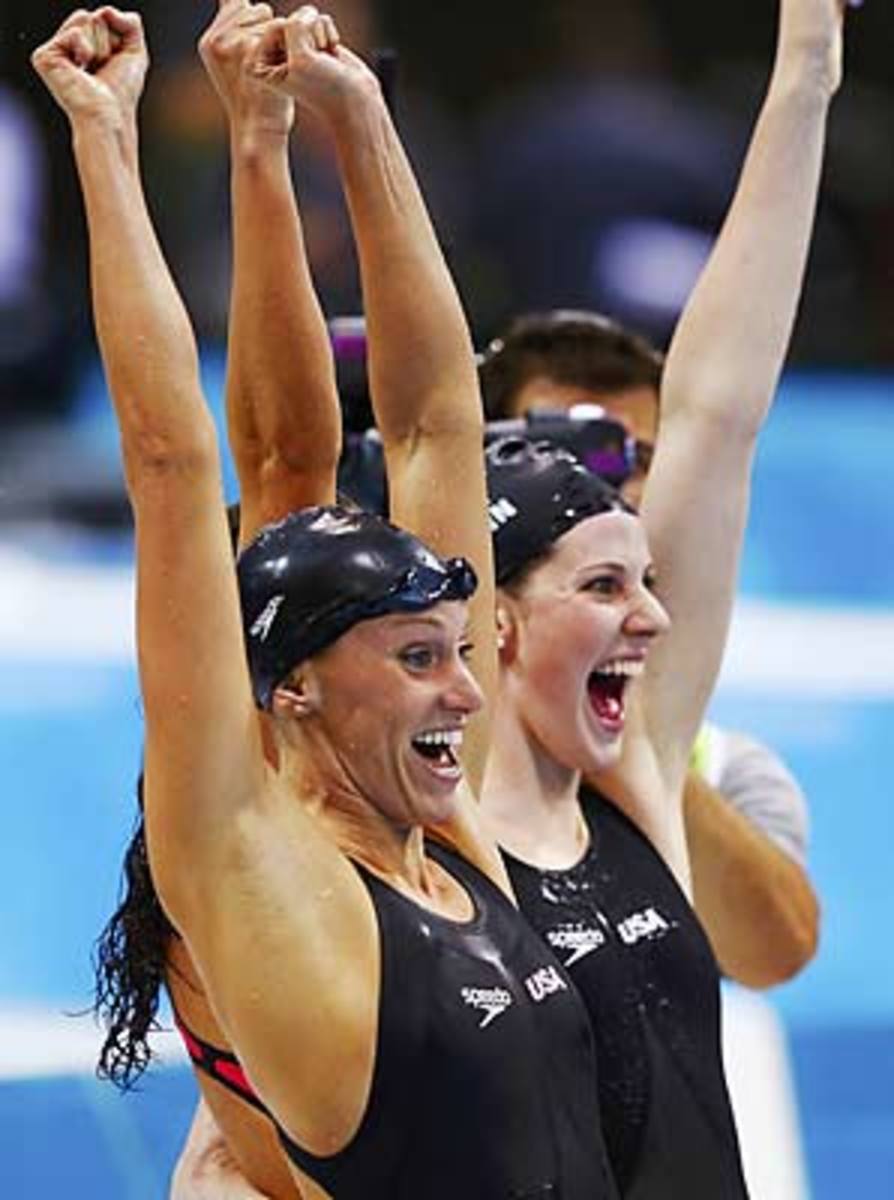Chemistry, camaraderie help U.S. women dominate pool in London
With their world record victory in the 4x100 medley relay Saturday night, the U.S. women's swim team did something even more impressive than their well-choreographed "Call Me Maybe" video. They capped their most successful swimming Olympics since the 1984 Los Angeles Games -- which were, of course, boycotted by the best competition.
This week, it didn't matter who showed up to race against them in the pool. The U.S. women were dominant, winning 14 medals -- eight of them gold (recent gold counts have been two in Beijing, three in Athens and seven in both Sydney and Atlanta).
And they dominated the medley relay -- an event they hadn't won since 2000 and which had been owned by Australia. Two veterans, Dana Vollmer and Rebecca Soni, and two younger swimmers -- Allison Schmitt, 22, and Missy Franklin, 17 -- combined for a world record time of 3:52.05.
Their world record was overshadowed again by Phelps, who was swimming his last race before retirement. Phelps swam the butterfly leg of the men's 4x100 medley relay, which also won gold -- his 22nd medal, 18th gold.
But while Phelps's retirement leaves a void in the men's program, the women's team seems well-positioned for the future, with young stars such as Franklin and Katie Ledecky, the 15-year old who won the 800-meter free.
"The energy has gotten better every night, each session," said Vollmer, who set a world record in the 100-butterfly earlier in the week and swam a dominating butterfly split of 55.48 in the relay session. "It's been incredible to watch the young ones step up. I've been in awe of what USA swimming is going to offer for many, many years."
It was fitting that their week of competition ended with a big group hug, after Schmitt's final freestyle leg. Because this was a team effort and the women competing said the atmosphere in London was different: open, honest and motivating.
"It was so much fun to talk with each other, instead of being talked at," Soni said.
The women attributed much of their success to the environment created by new U.S. coach Teri McKeever. McKeever, the first woman coach of the U.S. team, plotted for months how to create team chemistry in a short time.
"I've spent my entire career trying to do that piece," said McKeever, who has turned Cal's collegiate team into a national powerhouse. "I didn't know if I could do it in three weeks, but I think we achieved a level of that."
On past teams, there have been rivalries and jealousies and an indifference to team unity.
"There have been trips in the past where I don't think I knew everyone's name," Vollmer said. "But I know everyone's first and last names, all the staff members, all the guys...Teri has always told me that when I'm older I'm not going to remember my times or how many medals I won. It's going to be the relationships I made."
Vollmer, who swam for McKeever at Cal and trains with her, thinks gender makes a difference.
"Women handle emotions differently and handle stress differently," she said. "I've had coaches come up to me before the race and say, 'You can get the world record. You have to have a perfect turn.' I get so stressed out. Teri comes up and says, 'You've done the work. You're ready to do this. Have fun.'
"All of us want to win. We know the honor of what it means. Sometimes before the race it's not what we need to hear."
The nurturing fun atmosphere was a perfect launching pad for future stars like Franklin and Ledecky.
"I've had so much fun and gotten so much motivation," Franklin said. "I'm going to have so much fun over the next four years, and hopefully I'll be there in 2016."
In the interview area, McKeever bumped into Vollmer and gave her a long hug. McKeever's first trip with U.S. swimming was also Vollmer's when she was just 12 and kept falling asleep on the bus. McKeever coached her at Cal and then helped rebuild Vollmer's confidence after she didn't qualify for Beijing. She was confident that Vollmer would be an Olympic champion.
As they hugged -- at the end of eight intense, wildly successful days -- McKeever's eyes filled with tears.
"It just kind of hit me that it's been this good," McKeever said. "I'm proud of my role and I think it made a difference and I'm proud of the people I get to work with.
"And I'm tired. So I start crying."
It's a girl thing. Which is good.





